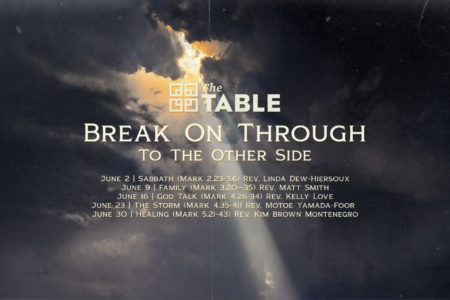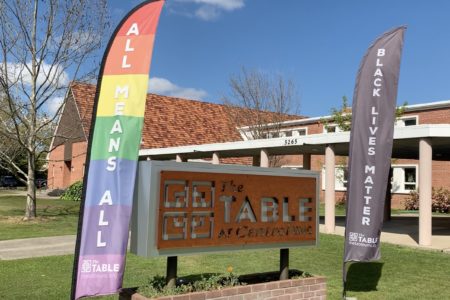"Inclusive" Tagged Sermons (Page 5)
Sabbath
This week we begin a five-week worship series on breaking through to the other side with Jesus. Each week in the month of June we’ll hear from a different preacher as we hold the lectionary readings assigned to the global church from the book of Mark and wonder about the call of Jesus to break through into new understandings of life and faith. This week we hold the reading from Mark 2 and the practice of Sabbath rest. Worship online…
Lost. Forgiven. Sent.
Worship online with thetable.live. CCLI #805699 / CCLI Streaming #094804
Fire!
Worship is rooted in Acts 2 and the Holy Spirit visitation at Pentecost.Worship online with thetable.live. CCLI #805699 / CCLI Streaming #094804
Up and Out
Worship today invites us to reflect upon how this “oneness” emboldened the early Christian community to practice their faith. Worship online with thetable.live. CCLI #805699 / CCLI Streaming #094804
Even Them?
Worship is rooted in the movement of the Holy Spirit as recorded in the book of Acts. The movement of the Holy Spirit invites us to draw our circles wide and to let go and cross boundaries of exclusion. Worship online with thetable.live. CCLI #805699 / CCLI Streaming #094804
Sharing With Everyone
This four-week worship series in April will hold readings from the Book of Acts alongside our hopes for creating community which is rooted in the ways of the Risen One for today. This morning’s worship holds Acts 4.32-35 alongside the early Christian community’s practice of “holding in common.” Worship online with thetable.live. CCLI #805699 / CCLI Streaming #094804
One Heart and Mind
Our four-week worship series in April holds readings from the Book of Acts alongside our hopes for creating community which is rooted in the ways of the Risen One for today. This morning’s worship is rooted in Acts 4. Amid threats from those in positions to judge, the early followers of Creator Sets Free (Jesus) turned to prayer and found a boldness born through intimacy with one another and the Spirit of God in their midst. They disciples came to…
Death Defeated & Life Returned
Our four-week worship series in April holds readings from the Book of Acts alongside our hopes for creating community which is rooted in the ways of the Risen One for today. This morning’s worship is rooted in Acts 4 and the experience of resurrection’s defeat of death and restoring of life. Worship online with thetable.live. CCLI #805699 / CCLI Streaming #094804
Held in Common
This four-week worship series in April will hold readings from the Book of Acts alongside our hopes for creating community which is rooted in the ways of the Risen One for today. This morning’s worship holds Acts 4.32-35 alongside the early Christian community’s practice of “holding in common.” Worship online with thetable.live. CCLI #805699 / CCLI Streaming #094804
Easter
Our Easter worship celebrations are rooted in the account of resurrection from Mark’s Gospel. The women found the stone rolled away from the burial cave on that first Easter morning. Terror and amazement covered their bodies like a blanket; leaving them in silence. The faithful silence of the women creates space for the mystery and power of God’s presence to resound. Resurrection doesn’t just pull back the lid from an ancient tomb in Israel or uncover a single grave stone…
Action Verbs
CLIMATE + FAITH: A Lenten worship series at The Table on how we can help meet the greatest challenge in human history. We turn this week to Mark 11:1-11 and Palm Sunday. How does thinking about palm branches as a link to the exodus story, and “Hosanna” as meaning “Save us, we pray!”, change your experience of Palm Sunday? How does it enrich your experience of the movement for a healthy climate? Worship online with thetable.live. CCLI #805699 / CCLI…
The Fullness of Time
CLIMATE + FAITH: A Lenten worship series at The Table on how we can help meet the greatest challenge in human history. In virtually every transformative movement in human history – the abolitionist movement against slavery, the Civil Rights Movement in the United States, the movements for women’s suffrage, labor protections, dismantling apartheid in South Africa, the list goes on – in each of these cases, people of faith have been at the center of the action. Catalysts. Laborers. Visionaries.…







